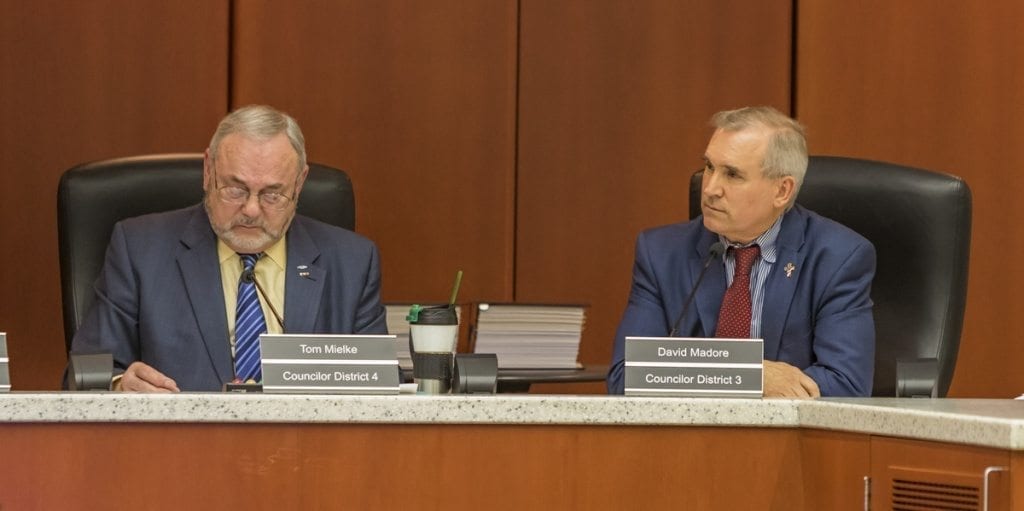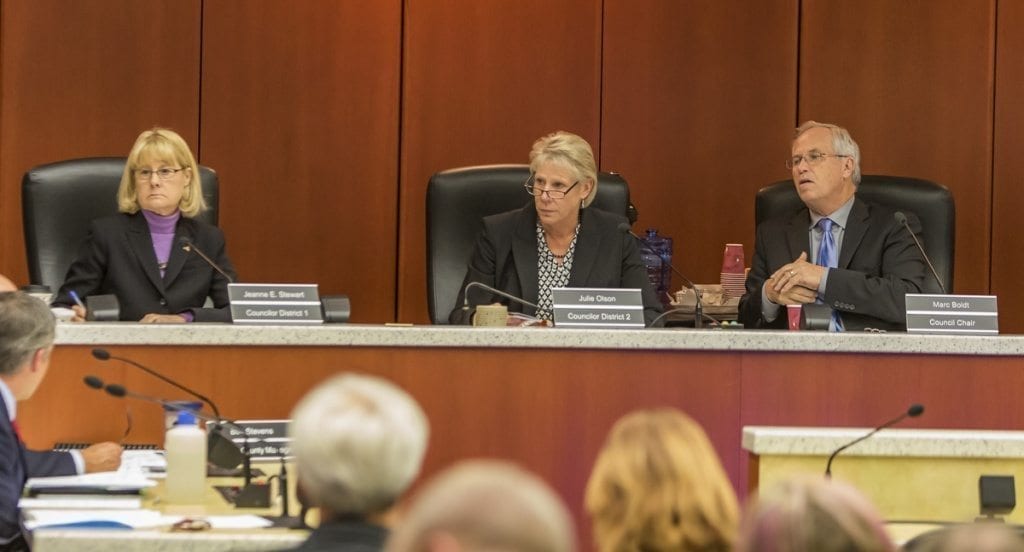VANCOUVER — After three days of meetings that followed a year-long process, the Board of County Councilors passed Clark County’s 2017-2018 biennial budget Wednesday.
The final days of the budget process included considerable disagreement among the councilors that yielded very few approved amendments to the $321 million budget proposed by County Manager Mark McCauley and his staff. In the end, councilors Marc Boldt, Jeanne Stewart and Julie Olson voted to approve the budget and councilors David Madore and Tom Mielke voted against approval.

The final three days of budget meetings revealed a stark difference in philosophy between the council majority and minority. McCauley and his budget staff used a much more conservative projection of growth for Clark County in the coming years and those projections were obviously supported by the majority of the council that voted to approve the budget. Councilors Madore and Mielke felt the staff’s growth projections should be more optimistic, which would reduce the projected budget shortfall of $22.6 million.
“Our economic engine has taken off, it’s booming, it’s growing,’’ Madore said Wednesday. “We’ve got a windfall of revenue pouring into our county now and it looks like it’s going to continue.’’
Figures provided by the county during the budget process show that property taxes have increased in recent years and that is expected to continue, projecting that revenue to grow from $58 million in 2016 to $61 million in 2018, the second year of this biennial budget.

Sales tax revenue has risen by an even greater rate than property taxes in Clark County during recent years, increasing from $22 million in 2009 to $36 million in 2016. Despite that, McCauley and his budget staff used a projected 4 percent increase in sales tax in their model going forward. County staff also pointed out that a planned annexation by the city of Vancouver in the Green Meadows/Costco area will result in a loss of revenue beginning in 2018.
As a result of the projected budget shortfall, the county will take several actions associated with the budget process including ongoing reductions or revenue enhancements that reduce the $22.6 million shortfall by $6 million. To address the remaining $16.6 million General Fund shortfall, the recommended budget includes:
- $2 million from expected vacancy savings
- Enacting the 1 percent property tax increase approved by voters to generate $1.8 million
- Retrieving $600,000 in lost fee revenue by centralizing billing and collections reducing county vehicle expenses by $1 million
- Eliminating the remaining $540,000 General Fund subsidy to development engineering, which is now fully funded
- Using $1.8 million in alternative funding sources where eligible, such as mental health sales tax and real estate excise tax
- Reestablishing parking fees in parks and raising shelter fees, which is anticipated to generate approximately $400,000
- Additional departmental reductions of approximately $800,000
- $1.3 million expense reduction related to the loss of the records contract with Vancouver
The plan to raise taxes, reinstate parking fees and raise shelter fees in parks, and using alternative funding sources didn’t sit well with Madore and Mielke.
“We’ve shown repeatedly that we don’t have to increase property taxes to pay the bills,’’ Mielke said. “We continue to make Clark County unaffordable. When we do that, it affects the people who want to relocate here and their businesses.’’

Deputy County Manager Bob Stevens and Budget Director Adriana Prata expressed to the councilors that it was their philosophy that a more conservative projection spread over more years of data was the more responsible approach to the budget process.
“Counting on this type of long-term growth is very risky and as professionals we cannot support that,’’ Prata said.
“Four years is not a long time,’’ Stevens said in response to Madore’s focus on the county’s sales tax revenue increases in recent years.
In an effort to eliminate the shortfall, Madore and Mielke proposed 24 amendments to the proposed budget on Wednesday. One of those amendments mirrored a proposed amendment already presented by Councilor Olson to increase support by $118,468 to the Mental Health Sales Tax Fund in each of the two years of the biennial budget ($236,936 total). Olson’s amendment was approved.
Councilors Madore and Mielke prepared a presentation to go with their proposed amendments, which they were not allowed to share during the meeting. Instead, the two took turns proposing their amendments and the justification for them, but each of the remaining 23 failed to gain approval by the same 3-2 vote with Boldt, Stewart and Olson voting “No’’ during each roll call vote.

Madore and Mielke’s proposed amendments included:
- A reduction of the vehicle allowance for county councilors from $700 to $50 and the reimbursement of councilor mileage at the prevailing IRS rate (savings of $42,000 to $78,000 ongoing).
- The elimination of three positions from the county council budget; chief of staff, administrative services manager I and program manager II (savings of $813,216 ongoing).
- A reduction of the county’s contribution to the Columbia River Economic Development Council from $141,935 to $10,000.
- Amend the sales tax revenue growth rate to 9.14 percent in 2017 and 6 percent in 2018 ($5,640,000 ongoing).
- Four separate amendments honoring the request of Sheriff Chuck Atkins to restore about $2.7 million in funding to the Sheriff’s Office.
Atkins and Darin Rouhier, the finance manager for the sheriff’s office, made a presentation to the councilors at Monday’s meeting. The presentation included evidence that Clark County spends less per capita on sheriff and jail services than most counties in Washington. For example, one chart presented by the two showed the average in the state was $141.17 annual per capita spending compared Clark County’s $121.97.
Instead of the recommended budget reductions totalling $2,706,614, Atkins proposed a $562,580 reduction of the sheriff’s budget.
“He (Sheriff Atkins) presented to us the compelling reasons why this isn’t a reasonable cut,’’ Madore told his fellow councilors. “He held open houses and came back and related to us that the citizens told him this is their highest priority, for us to be able to satisfy the minimum needs that our sheriff has conveyed to us. We need to put the biggest rock in the budget jar first.’’

Even though the budget passed without restoring the funds to the sheriff’s budget, Councilors Stewart and Olson vowed to continue to work toward providing Atkins with the funding he requested.
“There is a plan in place to try to keep them whole,’’ Olson said. “We have a long-term approach for hiring deputies.’’
“We’ve been very careful and diligent, as has the sheriff’s office, to maintain the hiring of deputies,’’ Stewart said.
The approved budget projects an ending unreserved cash balance of more than $23 million, which meets the standard set previously by the council. Numbers provided by Madore and Mielke show that unreserved cash balance exceeded $30 million in 2013 and 2015.
“We don’t have to say it works, we’ve proven for the last four years that it works,’’ Mielke said of the approach favored by he and Madore. “That reserve was down to about $12 million at one point. We worked hard to make these changes. I would have hoped we would have taken more action.’’
In conceding defeat, Madore said the Clark County residents were the real losers in this now-completed budget process.
“This is not supposed to be the staff’s budget,’’ Madore said. “This is supposed to be the people’s budget. We were outvoted, but that’s the way the system works. We lost. The citizens we represent lost. They’re going to pay a whole lot more even while our sheriff will be working with less.’’




